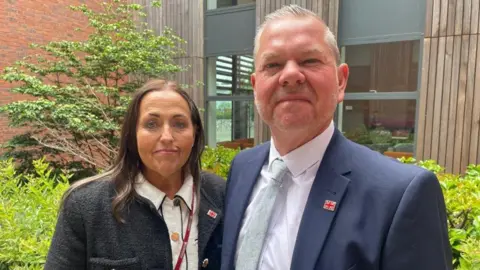In a significant political shift for Worcestershire County Council, the deputy leader, David Taylor, has officially resigned from his position just three months after assuming the role. Affiliated with the Reform UK party, Taylor made headlines earlier this year when he was elected to represent Redditch East. His departure from the deputy leadership comes amidst internal turmoil within the council’s governing body, raising concerns about the stability and effectiveness of leadership at the county level.
Despite stepping down as deputy leader, Taylor will retain his position as a cabinet member, specifically overseeing the One Worcestershire initiative, which is focused on local government reorganization. In a temporary arrangement, council member Rob Wharton will assume the deputy leader role until a permanent successor is appointed. This interim solution was confirmed by council leader Joanne Monk, who emphasized the council’s commitment to maintaining continuity during this transition.
The reasons for Taylor’s resignation have yet to be publicly disclosed, and both Taylor and the local Reform UK group have refrained from elaborating on the circumstances surrounding this decision. This lack of clarity has drawn particular attention, with critics, including Conservative group leader Adam Kent, interpreting the situation as a sign of disarray within the ruling party. Kent characterized the council’s current state as “chaos,” highlighting the impact that such instability could have on crucial decision-making processes facing Worcestershire, particularly those related to local government reform.
It is worth noting that David Taylor’s appointment as deputy leader was relatively recent; he officially took on the role on May 22 of this year and shortly after expressed pride in his new position, pledging to address pressing financial issues within the county. Taylor had previously stated that he was looking forward to a “fresh start” with a strong and capable cabinet ready to tackle local challenges.
Joanne Monk, leading the council, reiterated that Taylor’s resignation would be addressed at a forthcoming meeting where a new deputy leader will be elected. In the interim, Rob Wharton will manage dual responsibilities, balancing his own cabinet role focused on finance and efficiency while temporarily stepping in as deputy leader. Monk confirmed that despite resigning from one leadership role, Taylor would still play a pivotal role in the council’s leadership team, particularly on matters concerning the reorganization of local government.
The current situation prompted strong reactions from various factions, notably the Conservative opposition, which has critiqued the Reform UK’s handling of leadership transitions and internal challenges. Kent’s remarks suggest a broader concern about the council’s capacity to function effectively at a time when pressing decisions regarding local governance are on the horizon. He accused the Reform UK party of prioritizing internal conflict over responsible leadership and effective governance, potentially jeopardizing the interests of local residents.
As the council prepares for the appointment of a new deputy leader, the coming weeks will be critical in determining the stability and direction of Worcestershire County Council. The ongoing discourse around Taylor’s resignation may serve as a reflection of larger political dynamics within the council and highlights the potential ramifications of party cohesion—or lack thereof—on local governance.
This story emerges from the Local Democracy Reporting Service, an organization focused on covering council actions and other public service developments. As this situation unfolds, it remains crucial to observe the council’s movements and how leadership changes will impact local policies and the community at large.











